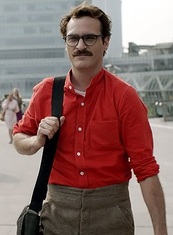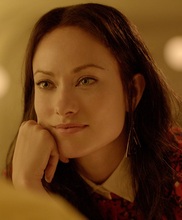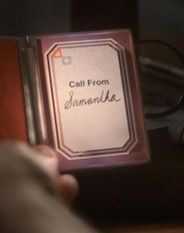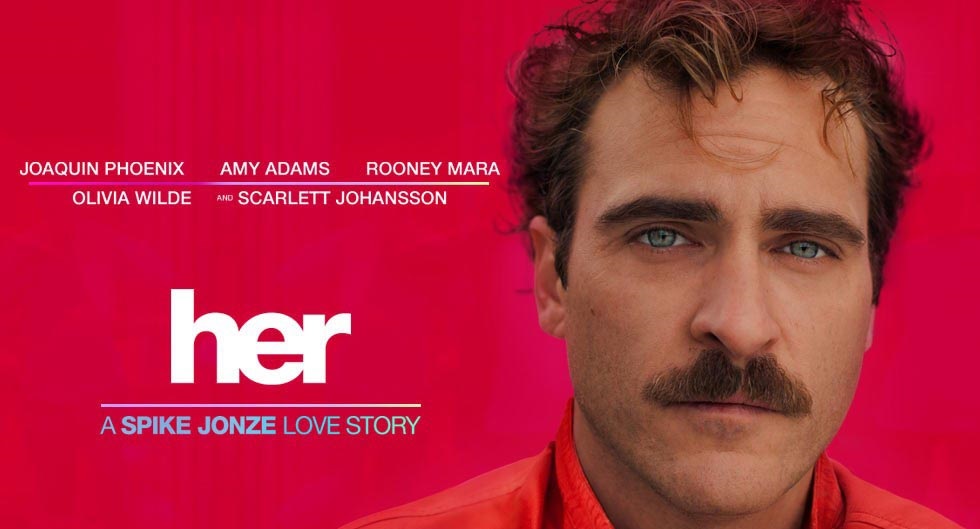“Bounty always receives part of its value from the manner in which it is bestowed.”
-- Samuel Johnson
-- Samuel Johnson
 Phoenix as Theodore
Phoenix as Theodore Fresh off the announcement that Her was nominated for 5 Academy Awards (Best Picture, Best Original Screenplay, Best Original Score, Best Original Song, and Best Production Design if you were curious), yet criminally got shut out in the acting categories (Joaquin Phoenix's performance speaks for itself, and I don't care that you can't see Scarlett Johansson; that makes it more impressive, not less!), it seemed a good time to go on record: Her is a Top 20 movie of all time. It speaks to the power of the story that all the questions raised by a self-aware, learning O.S. and Spike Jonze's beautifully fleshed-out near-future aren't even what you're thinking about when you leave the theater. It's the relationship between Theodore (Phoenix) and Samantha (Johansson) that sticks with you. While 5 nominations might sound like a pretty good haul, this is in a year when The Lone Ranger got 2 of them. But enough of the comparatives; how does Her do on its own?
 Mara as Catherine
Mara as Catherine Phoenix plays Theodore Twombly, a man who makes a living by masterfully writing people's personal letters for them, yet according to his soon-to-be ex-wife Catherine (Rooney Mara), can't handle the real emotion of his own life. Ostensibly to better organize his life, Theodore installs a newly released O.S. that for the first time has artificial intelligence. The installation asks Theodore several questions including whether he'd like a male or female voice and to describe his social status and relationship with his mother (the installation sounds like the makers of the software were specifically after people bonding with their O.S., rather than that happening by chance) and from there he only has to wait a few seconds for Samantha to compile, and their relationship (which can be categorized in numerous ways over the course of the movie) begins. The fact that she isn't a "real person" (which would depend on your definition), is viewed in various lights by the different characters, from acceptance, to dismissal, to being downright ignored.
 Adams as Amy
Adams as Amy Amy Adams gets back to her girl-next-door roots as Theodore's neighbor / best friend, and Olivia Wilde takes a delightful turn as a mentally unstable blind date Theodore gets set up on. Jonze's message isn't subtle: people's ability to manage their interpersonal connections is deteriorating as we become more and more attached and reliant upon our technology. His message isn't some sort of nouveau-Luddite one, however. He places the blame for this squarely on the people choosing to use technology in lieu of dealing with real emotion. His near-future is beautifully constructed, with foul-mouthed video game characters who protest the gamer being interrupted from playing, voice chat rooms that combine cyber-sex with personals ads (Kristin Wiig makes a short appearance to humorous effect here), and surrogates for sexual relationships with operating systems. If you haven't noticed from that list, the movie is more vulgar than the trailer would have you expect, but never too much and never without purpose.
 Wilde as Blind Date
Wilde as Blind Date Phoenix is asked to share the screen with no one for much of the movie save for brief interactions with his friends and side characters. These encounters are actually somewhat jarring given that he now has someone to lock eyes with. In between these oases of human contact, Phoenix does a masterful job adopting the mannerisms of someone who performs most of the movie as the equivalent to a real long phone call. His eyes move over the room, stopping on nothing in particular as he thinks about what to say to Samantha, and his facial expressions are unadulterated reactions to what she says back. Ultimately, Samantha's lack of a body and ability to think and learn at a rate much greater than Theodore's introduce the requisite complications into their relationship. Her presents challenges to current notions of love and exactly what is required for that emotion to take root. Does there need to be physical contact or form for an emotional connection?
 Johansson as Samantha
Johansson as Samantha Jonze (who also wrote the screenplay and spent 10 years formulating the idea) lets his just-barely-sci-fi concept speak for itself and never takes the chance to show us how clever he is at coming up with it (though the occasional self-indulgence would've been deserved). He makes us surprisingly at ease with the foreign concepts we're seeing on the screen by keeping them just familiar enough to be relatable. Johansson plays Samantha with a sort of muted wonder and curiosity that could've been played up a little more, but is probably exactly what Jonze asked of her. If she plays the role with a larger sense of childlike wonder, as an AI just introduced to the world might possess, it would lend a creepy vibe to their relationship that would distract from the story. While using stories set in the past with modern sensibilities to illustrate a point about our modern lives is more familiar to audiences, Her masterfully uses outlandish scenarios while brushing aside the grandiose questions they present to focus on its core point: we are simultaneously desperate to make a connection and terrified of what that connection entails.
An incredible movie with haunting, heartbreaking performances and a resonating message.



 RSS Feed
RSS Feed